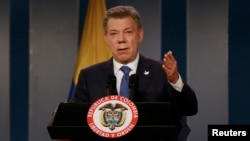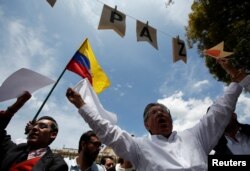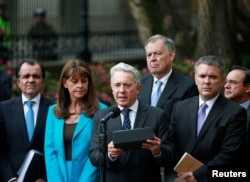The U.S. plan to send millions of dollars in aid to Colombia next year is not expected to be affected by Sunday's surprising defeat at the polls of a peace plan intended to end 52 years of civil war.
"There is no discussion at this point within the [U.S.] government" about American assistance to Colombia, a senior U.S. official said Wednesday in response to a VOA query. "Our hope is that the peace accord will go forward with national support."
Congress is expected to approve $400 million in development aid and about $50 million in counter-narcotics assistance for Colombia for fiscal 2017. In years past, the U.S. spent billions of dollars in military aid to help the Colombian government combat the Revolutionary Armed Forces of Colombia (FARC) and bring it to the negotiating table.
Colombian officials have been meeting in Cuba with FARC representatives to try to save the peace deal that voters narrowly rejected Sunday.
Cease-fire extension
Colombian President Juan Manuel Santos said he was extending a cease-fire agreement with the rebels until October 31, in the hope negotiators can find a way to salvage the peace agreement, which both sides signed last week.
"Time is very important. We can't prolong this process and this dialogue for a long time because we're in a gray zone, a sort of limbo, that is risky and can wash away the entire process," Santos said.
FARC senior leader Rodrigo Londoño Echeverri, known as Timochenko, was skeptical about extension of the cease-fire until the end of the month. "And after that, the war continues?" the rebel leader asked on Twitter.
The senior U.S. official who spoke to VOA said FARC leaders have "made it clear they want the peace process to continue, and they want to negotiate a settlement to the war."
U.N. Secretary-General Ban Ki-moon said he has "urgently" dispatched special representative Jean Arnault to try to assist the consultations in Cuba. The U.S. special envoy for the Colombian peace process, Bernie Aronson, also is in Havana.
Santos and FARC's Timochenko signed the peace agreement on September 26 in Cartagena, at a ceremony attended by Ban, U.S. Secretary of State John Kerry, and a number of heads of government and foreign ministers.
Meeting with Uribe
In addition to resuming negotiations with the rebels, Santos met with former Colombian President Alvaro Uribe, who led the opposition campaign against the peace deal. Uribe told a Colombian radio station he was willing to provide input on a way forward to peace with FARC and an end to the country's half-century of conflict.
Colombians voted down the peace deal 50.2 percent to 49.7 percent, a margin of 54,000 ballots. Earlier polls had forecast approval by a 2-to-1 margin.
"Colombia is still a divided nation," said Andrea Saldarriaga Jiménez, a native of Bogota who is a program assistant at the Atlantic Council, an international affairs policy research group in Washington.
In a posting Wednesday on the council's website, Jiménez said the country is polarized because "many Colombians don't think that the FARC should be allowed to participate in politics. They believe that criminals should be in jail and not in government."
The guerrilla war began as a simple peasant uprising in 1964, but since then it has killed more than 220,000 people and driven millions from their homes.
FARC used drug trafficking as a major source of funding, and the militants kidnapped politicians and foreigners, holding them hostage in remote jungle hideouts.
VOA's Steve Herman contributed to this report.






